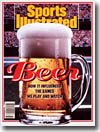Bob started graduate school at the University of Washington (which I recently visited and photographed) in the fall of 1984, where he worked with Claude Steele. When Claude moved to Michigan for the Fall 1987 semester, Bob came along. Initially during their time at UM, Claude and Bob finished writing up manuscripts on their "alcohol myopia" research. Bob then branched into additional areas, such as self-esteem and decision-making.
Based on the starting date of his graduate training (1984) rather than the start of his time at Michigan (1987), Bob was considered part of the same entering cohort with me and my classmates. Bob had three essential attributes -- he was a nice guy, an excellent and enthusiastic researcher, and a big sports fan -- and we became good friends.
Bob and I have both been based in the Lone Star State (and Big XII athletic conference), for many years, he at the University of Texas, Austin the entire time since completing his Ph.D., and me at Texas Tech for the last nine years. Given this proximity, we sometimes see each other at meetings of Social Psychologists in Texas (SPIT) and other organizations.
Probably my favorite grad-school story involving Bob stems from one of the aforementioned alcohol-myopia papers he was working on (which ultimately was published in 1990 in the Journal of Abnormal Psychology). Around this time (in August 1988), Sports Illustrated came out with a cover story on the role of beer in fan behavior, as seen on the right.

The SI piece actually made some conceptual points relevant to Bob's research paper, so he cited it. Then, a few months later, when he got the reviews back, Bob showed them to me. One of the referees had been taken aback by a citation to Sports Illustrated in a scholarly work! (I just checked the references for Bob's article, and the SI reference didn't make it into publication.)
Those were good times...